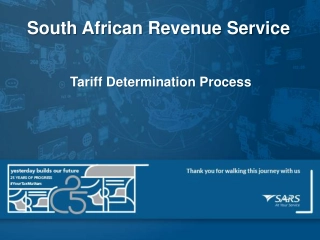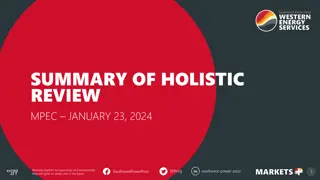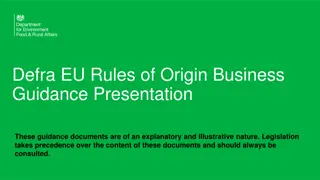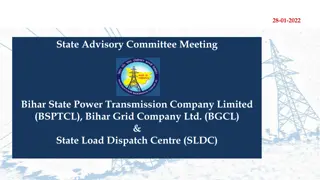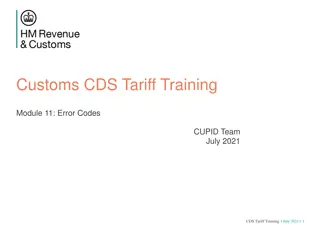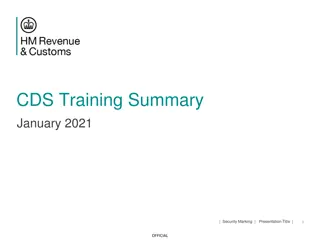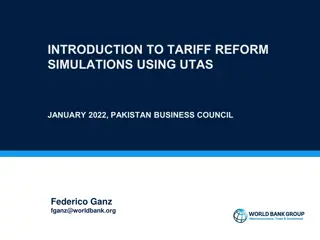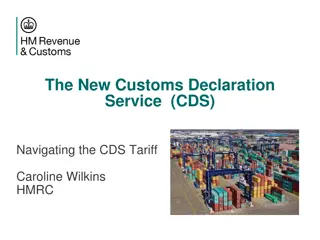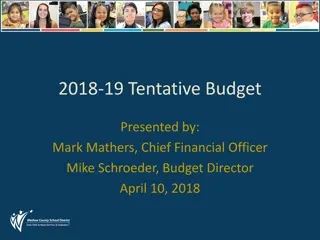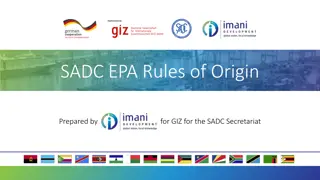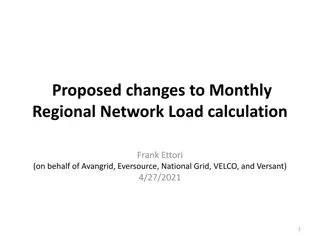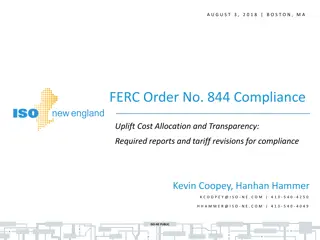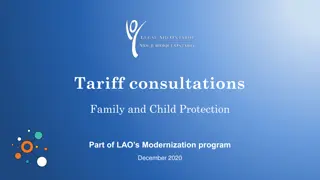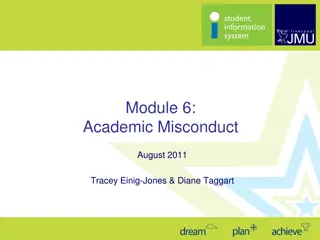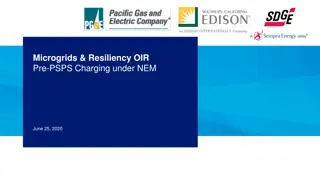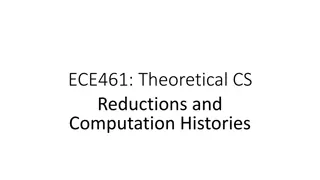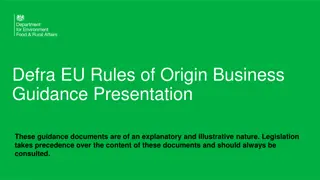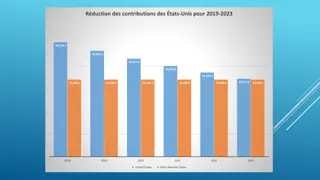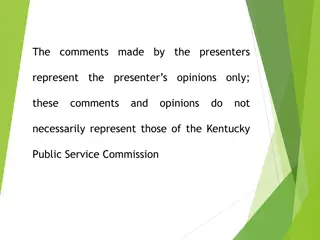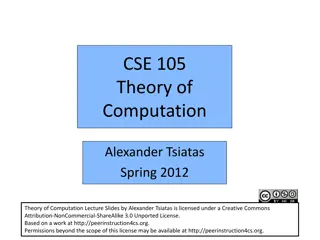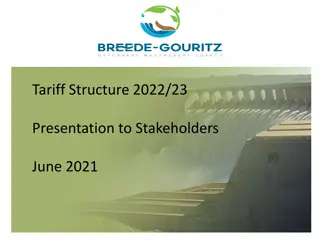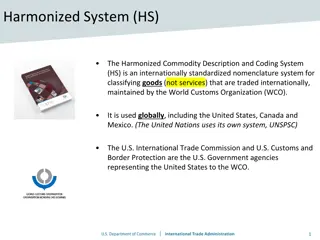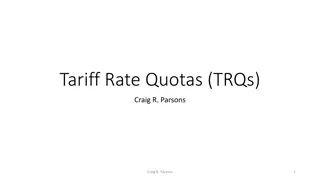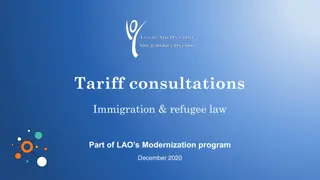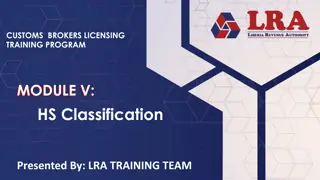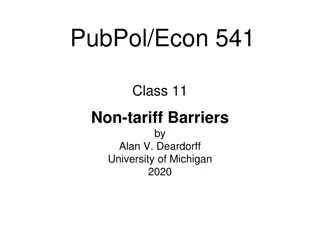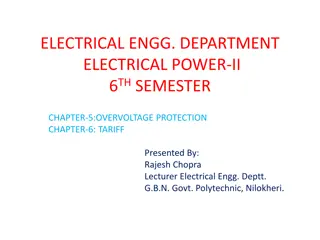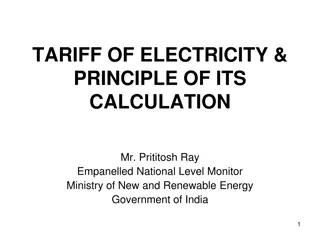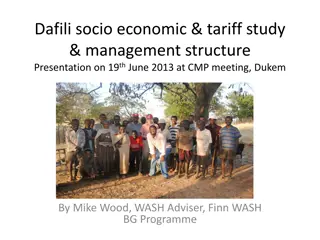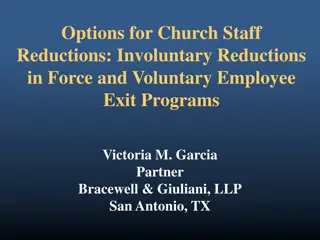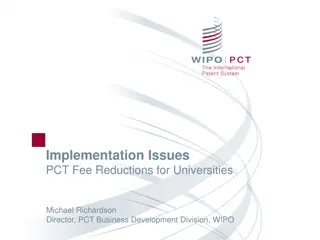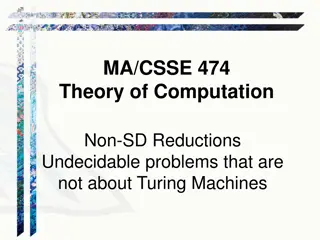Understanding SARS Tariff Determination Process
Explore SARS procedures for tariff determination and legislation provisions. Discover key discussions on customs, compliance, and international conventions.
1 views • 47 slides
Summary of Holistic Review of MPEC Tariff
Provide a summary of the holistic review conducted by SPP Staff on the MPEC Tariff, covering both non-substantive and substantive changes made for review and approval by MDWG. The review includes critical dates, tariff outline, updates from working groups/task forces, and a detailed table of content
0 views • 11 slides
Understanding Rules of Origin and Tariff-Free Trading with the EU
Rules of Origin (RoO) determine the economic nationality of a product, impacting tariffs and restrictions. To trade tariff-free with the EU, compliance with RoO is crucial. Specific rules dictate ingredient sourcing, with certification processes ensuring eligibility for tariff reductions. Certain pr
0 views • 19 slides
Understanding Trade Barriers and Tariff Classification
Explore the concept of trade barriers, including tariff and non-tariff barriers, their objectives, types, and classification. Learn about the benefits of tariff barriers, like discouraging imports and protecting home industries, and the classification of non-tariff barriers such as the quota system
3 views • 28 slides
Advisory Committee Meeting Summary for BSPTCL, BGCL & SLDC
The meeting discussed various topics including tariff petitions, business plans, network status, capacity additions, and cost optimizations for BSPTCL, BGCL, and SLDC in Bihar. Tariff projections, revenue requirements, transmission charges, and revenue surpluses were also analyzed and carried forwar
0 views • 23 slides
Understanding Error Codes in Customs CDS Tariff Training Module 11
This module focuses on interpreting error messages, identifying issues, and correcting errors in Customs CDS Tariff declarations. Learn about error code reference numbers, error descriptions, error locations, and how to fix common issues. Gain insights into cross-validation errors and protective mar
0 views • 13 slides
CDS Training Summary January 2021: Security Marking Presentation
In the CDS Training Summary for January 2021, the focus is on navigating the CDS Volume 3 Tariff, covering declaration categories, data elements, procedure codes, additional information codes, document codes, and more. The training provides a step-by-step guide on using the CDS Tariff, Volume 3, for
0 views • 69 slides
Understanding Tariff Reform Simulations Using UTAS
This presentation introduces tariff reform simulations using UTAS in the context of the car economy example. It covers how tariffs on imported goods impact production costs and effective protection of domestic industries. Key concepts such as output tariff, upstream tariff, and effective protection
0 views • 15 slides
Understanding Electricity Pricing and Tariff Structure in Pakistan
Electricity pricing involves costs of power plant operations and grid maintenance, impacted by factors like fuel cost, regulations, and consumer demand. Pakistan's tariff structure uses an incremental block tariff system to manage usage, with mechanisms set by regulators for fair pricing and afforda
0 views • 16 slides
Comprehensive Guide to the New Customs Declaration Service (CDS)
Navigating the CDS Tariff, UCC alignment, strategic facilitations for UK business, and essential information on the Customs Declaration Service. Learn about data elements, tariff publications, and key changes under CDS for a comprehensive understanding of the trade environment.
0 views • 27 slides
Budget Presentation: FY2018-19 Tentative Budget Overview
The FY2018-19 Tentative Budget was presented by Mark Mathers, CFO, and Mike Schroeder, Budget Director. The presentation covered updates on the General Fund, structural deficits, budget recommendations, and required actions to address the deficit. Base budget reductions have reduced the deficit to $
3 views • 50 slides
Technical Soundness of EU-SADC EPA Rules of Origin
The implementation and technical soundness of Rules of Origin under the EU-SADC EPA are crucial for the utilization of trade preferences. Compliance with rules of origin is essential for receiving tariff preferences, but drafting these rules accurately is challenging. Recommendations include specify
4 views • 12 slides
Understanding Tariff Systems in Mathematical Literacy - NQF Level 2
Exploring tariff systems in Mathematical Literacy at NQF Level 2, focusing on phone tariffs, calculations, and understanding bundled deals. Learn about different types of tariffs, their costs, and how to analyze and calculate monthly expenses for various phone plans.
0 views • 24 slides
Proposed Changes to Monthly Regional Network Load Calculation and Tariff Language
This proposal outlines changes to the Monthly Regional Network Load (RNL) calculation and tariff language for Avangrid, Eversource, National Grid, VELCO, and Versant. It emphasizes the usage of Monthly RNL in the Open Access Transmission Tariff (OATT) and its impact on Network Customers. The propose
0 views • 7 slides
FERC Order 844 Compliance: Uplift Cost Allocation and Transparency
FERC Order 844, issued in April 2018, mandates reporting on uplift payments and unit commitments, along with revising tariff language for compliance. ISO-NE is proposing new reports and tariff revisions to adhere to the Order, enhancing transparency in operational practices. The Order aims to improv
1 views • 30 slides
New UCAS Tariff for Higher Education Entry Overview
UCAS has introduced a new Tariff for higher education entry starting from September 2017. This toolkit is designed to assist teachers and advisers in understanding the changes, timeline, points system, university examples, myth debunking, and available resources. The aim is to prepare educators and
0 views • 32 slides
Santa Monica College Proposed Budget Summary 2021-2022
Santa Monica College's presentation of the 2021-2022 proposed adopted budget to the Board of Trustees on September 14, 2021, includes details on revenue, expenditure, budget reductions, and financial highlights from the 2019-2020 and 2020-2021 fiscal years. The budget outlines various actions taken
1 views • 31 slides
Emissions Reductions Beyond the Clean Smokestacks Act (CSA) Overview
Emissions Reductions Beyond the Clean Smokestacks Act (CSA) is a comprehensive program aimed at improving air quality by imposing limits on pollutant emissions from coal-burning facilities. The act has successfully achieved significant reductions in nitrogen oxide (NOx) and sulfur dioxide (SO2) emis
1 views • 12 slides
Overview of LAO's Tariff Consultations for Family and Child Protection Modernization Program
LAO is seeking input on tariff reform as part of its modernization program to enhance Ontario's legal aid system. The focus is on immediate, cost-neutral updates and future potential increases. Feedback will help simplify billing rules, improve online services, and streamline access to information,
0 views • 15 slides
Understanding LJMU Penalty Tariff for Academic Misconduct
The LJMU Penalty Tariff, implemented from September 2011, ensures fair and consistent penalties for academic misconduct at LJMU. Points are allocated based on criteria, with penalties ranging from allowing new work submissions to expulsion. AMP outcomes are recorded using Service Indicators that rem
0 views • 17 slides
Preparing Energy Storage Systems for Public Safety Power Shutoff Events
Modernizing the NEM tariff to allow pre-PSPS charging involves utilities proposing modifications to allow energy storage systems to temporarily import energy from the grid upon advanced notification of a PSPS event. This process includes coordination with developers/aggregators and consultation with
0 views • 7 slides
Understanding Reductions in Decidability and Tractability
Exploring the concepts of reductions, particularly many-one reductions, in the context of decidability and tractability. The lecture delves into the relationship between decidable and undecidable problems, highlighting examples like Rice's Theorem. It explains the definitions and implications of red
0 views • 20 slides
Understanding Reductions in Theoretical Computer Science
Explore the concept of reductions in theoretical computer science, where problems are converted into others allowing solutions to one to solve the other. Learn how reductions can prove languages to be undecidable using examples like ATM and HALTTM. Follow along as we discuss the application of reduc
0 views • 38 slides
Understanding Rules of Origin in EU-UK Trade
Rules of Origin (RoO) are essential in determining the economic nationality of products for tariff classification in EU-UK trade. Compliance with RoO is necessary for accessing preferential tariff rates under free trade agreements. This guidance outlines the principles, conditions, and requirements
0 views • 19 slides
Financial Overview of Reductions and Contributions in the United States (2019-2023)
The data highlights reductions in the contributions of the United States from 2019 to 2023, along with the total quota income of other member states. It also includes projected expenses and budgetary reductions applied annually, categorized into personnel and non-personnel. The information provides
0 views • 5 slides
Kentucky Public Service Commission Overview
Kentucky Public Service Commission (PSC) is responsible for regulating non-recurring charges, purchased water adjustments, and ensuring utilities adhere to tariff regulations. The PSC provides forms and guidelines for cost justifications and filings, along with information on utility regulations. Th
0 views • 40 slides
Undecidability Proofs and Reductions in Theory of Computation
Explore undecidability proofs and reductions in the context of Theory of Computation through examples and explanations. Understand how problems are reduced to show undecidability, with demonstrations involving Turing Machines and languages. Gain insights into proving statements like the undecidabili
0 views • 21 slides
Stakeholders Presentation on 2022/23 Tariff Structure
Consultation with stakeholders on the proposed Water Resource Management Charges for the 2022/23 financial year by the Breede-Gouritz Catchment Management Agency. The presentation covers operational capacity, strategic priorities, tariff process, and budget planning processes aligned with National T
0 views • 15 slides
Understanding the Harmonized System (HS) for International Trade
The Harmonized System (HS) is an internationally standardized nomenclature system for classifying goods traded internationally, managed by the World Customs Organization (WCO). It organizes goods into categories down to the 6-digit level, providing a common set of descriptive categories for global t
0 views • 10 slides
Understanding Tariff Rate Quotas (TRQs) in International Trade
Tariff Rate Quotas (TRQs) are commonly used in global trade, particularly in agricultural imports. They involve lower tariff rates on imports up to a specified quantity per year, with higher rates applied to any excess imports. This system aims to regulate trade and protect domestic producers. TRQ l
0 views • 10 slides
Legal Aid Ontario's Tariff Consultations and Modernization Program
Legal Aid Ontario (LAO) is modernizing its legal aid system to better serve the community by seeking input on tariff reforms, improving access to information, and redesigning Legal Aid Online. Through cost-neutral updates, LAO aims to enhance efficiency and accountability while ensuring fair payment
0 views • 16 slides
Customs Brokers Licensing Training Program Module V: HS Classification Overview
Enhance your knowledge and skills in customs brokerage to pass the licensing uniform examination successfully. This module covers the evolution of customs nomenclature, reasons for tariff classification, HS structure, and more essential topics. Participants will learn to define technical terms, comp
0 views • 38 slides
Understanding Non-Tariff Barriers in International Trade
Explore the types of Non-Tariff Barriers (NTBs) and Non-Tariff Measures (NTMs) such as quotas, Tariff-Rate Quotas (TRQs), Voluntary Export Restraints (VERs), and more. Learn about Administered Protection, Safeguards tariffs, Anti-dumping duties, Countervailing duties, and their implications on trade
0 views • 57 slides
Electrical Engineering: Overvoltage Protection and Tariff Concepts
In the field of electrical engineering, it is crucial to understand overvoltage protection mechanisms to safeguard against electrical surges caused by internal and external factors like switching surges and lightning. Various protection methods such as ground wires, earthing screens, and lightning a
0 views • 12 slides
Understanding Tariff of Electricity and Principles of Calculation
Electrical energy production involves costs that are shared by consumers based on the amount and nature of electricity consumed. This includes fixed costs for setting up power plants and variable costs for generating electricity, which covers fuel expenses. The calculation of electricity costs is ba
0 views • 18 slides
Dafili Socio-Economic & Tariff Study Presentation Summary
Presentation delivered by Mike Wood at a CMP meeting in Dukem on June 19, 2013, focused on a socio-economic and tariff study for the Dafili community. The study aimed to gather demographic data, assess the community's ability and willingness to pay for water, recommend affordable tariffs, and evalua
0 views • 29 slides
Understanding Complexity Theory: Decidability, Undecidability, and Reductions
Explore the concepts of decidability and undecidability in complexity theory, discussing the proof of undecidability for various languages. Learn about the acceptance problem and reductions, including mapping reductions, to relate and solve different computational problems effectively.
0 views • 14 slides
Effective Strategies for Church Staff Reductions: Involuntary and Voluntary Options
Explore effective strategies for church staff reductions, including involuntary reductions in force and voluntary employee exit programs. Learn about salary freezes, attrition reductions, and reduced work schedules/furloughs to navigate challenging situations while ensuring compliance with employmen
0 views • 36 slides
Challenges and Solutions in Implementing PCT Fee Reductions for Universities
Implementing fee reductions for universities under the PCT system involves defining eligibility, counting reductions, claiming reductions, ensuring consistency across Receiving Offices, and monitoring quota usage. Challenges include defining university eligibility, handling multiple applicants, and
0 views • 8 slides
Undecidable Problems in Theory of Computation
Explore the concept of undecidable problems in the theory of computation, focusing on non-SD reductions and undecidable problems not involving Turing Machines. Learn about proving languages are not SD, using examples like AanBn and creating reductions to show non-SD properties. Work through reductio
0 views • 31 slides
